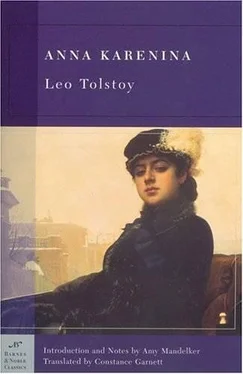Leo Tolstoy - Anna Karenina
Здесь есть возможность читать онлайн «Leo Tolstoy - Anna Karenina» весь текст электронной книги совершенно бесплатно (целиком полную версию без сокращений). В некоторых случаях можно слушать аудио, скачать через торрент в формате fb2 и присутствует краткое содержание. Жанр: Классическая проза, на английском языке. Описание произведения, (предисловие) а так же отзывы посетителей доступны на портале библиотеки ЛибКат.
- Название:Anna Karenina
- Автор:
- Жанр:
- Год:неизвестен
- ISBN:нет данных
- Рейтинг книги:4 / 5. Голосов: 1
-
Избранное:Добавить в избранное
- Отзывы:
-
Ваша оценка:
- 80
- 1
- 2
- 3
- 4
- 5
Anna Karenina: краткое содержание, описание и аннотация
Предлагаем к чтению аннотацию, описание, краткое содержание или предисловие (зависит от того, что написал сам автор книги «Anna Karenina»). Если вы не нашли необходимую информацию о книге — напишите в комментариях, мы постараемся отыскать её.
Anna Karenina — читать онлайн бесплатно полную книгу (весь текст) целиком
Ниже представлен текст книги, разбитый по страницам. Система сохранения места последней прочитанной страницы, позволяет с удобством читать онлайн бесплатно книгу «Anna Karenina», без необходимости каждый раз заново искать на чём Вы остановились. Поставьте закладку, и сможете в любой момент перейти на страницу, на которой закончили чтение.
Интервал:
Закладка:
The families of the Levins and the Shcherbatskys were old, noble Moscow families, and had always been on intimate and friendly terms. This intimacy had grown still closer during Levin's student days. He had both prepared for the university with the young Prince Shcherbatsky, the brother of Kitty and Dolly, and had entered at the same time with him. In those days Levin was a frequent visitor at the house of the Shcherbatskys, and he was in love with the Shcherbatsky household. Strange as it may appear, it was with the household, the family that Constantin Levin was in love, especially with the feminine half of the household. Levin did not remember his own mother, and his only sister was older than he was, so that it was in the Shcherbatskys' house that he saw for the first time that inner life of an old, noble, cultured and honorable family of which he had been deprived by the death of his father and mother. All the members of that family, especially the feminine half, were pictured by him, as it were, wrapped about with a mysterious poetical veil, and he not only perceived no defects whatever in them, but, under the poetical veil that shrouded them, he assumed the existence of the loftiest sentiments and every possible perfection. Why it was the three young ladies had one day to speak French, and the next English; why it was that at certain hours they played by turns on the piano, the sounds of which were audible in their brother's room above, where the students used to work; why they were visited by those professors of French literature, of music, of drawing, of dancing; why at certain hours all the three young ladies, with Mademoiselle Linon, drove in the coach to the Tverskoy boulevard, dressed in their satin cloaks, Dolly in a long one, Natalie in a half-long one, and Kitty in one so short that her shapely legs in tightly-drawn red stockings were visible to all beholders; why it was they had to walk about the Tverskoy boulevard escorted by a footman with a gold cockade in his hat- all this and much more that was done in their mysterious world he did not understand, but he was sure that everything that was done there was very good, and he was in love precisely with the mystery of the proceedings.
In his student days he had all but been in love with the eldest, Dolly, but she was soon married to Oblonsky. Then he began being in love with the second. He felt, as it were, that he had to be in love with one of the sisters, only he could not quite make out which. But Natalie, too, had hardly made her appearance in the world when she married the diplomat Lvov. Kitty was still a child when Levin left the university. Young Shcherbatsky went into the navy, was drowned in the Baltic and Levin's visits to the Shcherbatskys, despite his friendship with Oblonsky, became less frequent. But when early in the winter of this year Levin came to Moscow, after a year in the country, and saw the Shcherbatskys, he realized which of the three sisters he was indeed destined to love.
One would have thought that nothing could be simpler than for him, a man of good family, rather rich than poor, and thirty-two years old, to make the young Princess Shcherbatskaia an offer of marriage; in all likelihood he would at once have been looked upon as a good match. But Levin was in love, and so it seemed to him that Kitty was so perfect in every respect, a creature so far above everything earthly, while he was a creature so low and so earthly that it could not even be conceived that other people and she herself could regard him as worthy of her.
After spending two months in Moscow in a state of befuddlement, seeing Kitty almost every day in society, into which he went so as to meet her, he abruptly decided that it could not be, and went back to the country.
Levin's conviction that it could not be was founded on the idea that in the eyes of her family he was a disadvantageous and worthless match for the charming Kitty, and that Kitty herself could not love him. In her family's eyes he had no ordinary, definite career and position in society, while his comrades by this time, when he was thirty-two, were already one a colonel, and another a professor, another director of a bank and railways, or chairman of a board, like Oblonsky. But he (he knew very well how he must appear to others) was a country gentleman, occupied in breeding cattle, shooting game and building barns; in other words, a fellow of no ability, who had not turned out well, and who was doing just what, according to the ideas of the world, is done by people fit for nothing else.
The mysterious, enchanting Kitty herself could not love such an ugly person as he conceived himself to be, and, above all, such an ordinary, in no way striking person. Moreover, his attitude to Kitty in the past- the attitude of a grown-up person to a child, arising from his friendship with her brother- seemed to him yet another obstacle to love. An ugly, good-natured man, as he considered himself, might, he supposed, be liked as a friend; but to be loved with such a love as that with which he loved Kitty, one would need to be handsome and, still more, a distinguished man.
He had heard that women often did care for ugly and ordinary men, but he did not believe it, for he judged by himself, and he could not himself have loved any but beautiful, mysterious and exceptional women.
But, after spending two months alone in the country, he was convinced that this was not one of those passions of which he had had experience in his early youth; that this feeling gave him not an instant's rest; that he could not live without deciding the question as to whether she would or would not be his wife; that his despair had arisen only from his own imaginings, and that he had no sort of proof that he would be rejected. So he had now come to Moscow with a firm determination to make a proposal, and get married if he were accepted. Or… he could not conceive what would become of him if he were rejected.
VII
On arriving in Moscow by a morning train, Levin had put up at the house of his elder half-brother, Koznishev. After changing his clothes he went down to his brother's study, intending to talk to him at once about the object of his visit, and to ask his advice; but his brother was not alone. With him there was a well-known professor of philosophy, who had come from Charkov expressly to clear up a difference that had arisen between them on a very important philosophical question. The professor was carrying on a hot crusade against materialists. Sergei Koznishev had been following this crusade with interest, and after reading the professor's last article had written him a letter stating his objections. He accused the professor of making too great concessions to the materialists. And the professor had promptly appeared to argue the matter out. The point in discussion was the question then in vogue: Is there a line to be drawn between psychical and physiological phenomena in man? And if so, where?
Sergei Ivanovich met his brother with the smile of chilly friendliness he always had for everyone, and, introducing him to the professor, went on with the conversation.
A little man in spectacles, with a narrow forehead, tore himself from the discussion for an instant to greet Levin, and then went on talking without paying any further attention to him. Levin sat down to wait till the professor should go, but he soon began to get interested in the subject under discussion.
Levin had come across the magazine articles about which they were disputing, and had read them, interested in them as a development of the first principles of science, familiar to him when a natural science student at the university. But he had never connected these scientific deductions as to the origin of man as an animal, as to reflex action, biology and sociology, with those questions as to the meaning to himself of life and death, which had of late been more and more often in his mind.
Читать дальшеИнтервал:
Закладка:
Похожие книги на «Anna Karenina»
Представляем Вашему вниманию похожие книги на «Anna Karenina» списком для выбора. Мы отобрали схожую по названию и смыслу литературу в надежде предоставить читателям больше вариантов отыскать новые, интересные, ещё непрочитанные произведения.
Обсуждение, отзывы о книге «Anna Karenina» и просто собственные мнения читателей. Оставьте ваши комментарии, напишите, что Вы думаете о произведении, его смысле или главных героях. Укажите что конкретно понравилось, а что нет, и почему Вы так считаете.












